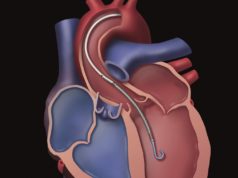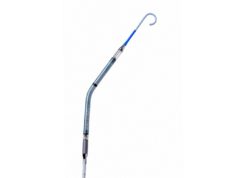 Results of the National Cardiogenic Shock Initiative—a single-arm multicentre study assessing the feasibility and effictiveness of utilising early mechanical circulatory support using the Impella (Abiomed) device in patients presenting with acute myocardial infarction complicated by cardiogenic shock—have demonstrate a 71% survival rate to hospital discharge.
Results of the National Cardiogenic Shock Initiative—a single-arm multicentre study assessing the feasibility and effictiveness of utilising early mechanical circulatory support using the Impella (Abiomed) device in patients presenting with acute myocardial infarction complicated by cardiogenic shock—have demonstrate a 71% survival rate to hospital discharge.
The study was led by a research team at Henry Ford Hospital in Detroit, USA, and was initially established as a collaboration between four hospitals in the Detroit area. The initiative was then expanded nationwide, involving 80 hospitals in 29 US states.
Final results from the national study, published in the Journal of the American Heart Association, were taken by looking at outcomes from 406 patients.
“The National Cardiogenic Shock Initiative is the largest prospective study of therapy for severe heart attack cardiogenic shock done in the USA in the past two decades,” said William O’Neill, Henry Ford Hospital, Detroit, USA), principal investigator of the study. “The impressive results from our study in the USA have also prompted the use of our protocol in Japan where they are experiencing similar great outcomes.”
The treatment algorithm emphasises quick recognition of the condition, followed by insertion of the Impella device for circulatory support, whereby doctors could then treat the cause of the heart attack.
The National Cardiogenic Shock Initiative study involved cardiologists at both community hospitals and large academic centers. Of the more than 1,100 patients who were screened, 406 were enrolled into the study. The study also isolated predictive markers that indicate a patient’s condition, an invaluable tool in determining treatment.
The National Cardiogenic Shock Initiative participating hospitals agreed to treat patients who presented with acute myocardial infarction and cardiogenic shock using a standard protocol, which involved rapid initiation of mechanical circulatory support with an Impella 2.5 or Impella CP heart pump, along with right heart catheterisation to assess status of right and left ventricular heart function. Patients were enrolled between July 2016 and December 2020.
“The study results show remarkable survival, the highest we’ve seen in any study so far,” said Babar Basir (Henry Ford Health, Detroit, USA), principal investigator of the study. “The results show that we now have therapy that can save lives and improve outcomes for people who’ve had severe heart attacks and we haven’t had results like these in 20 years. The protocol has already saved many lives and will continue to do so as more hospitals adopt its principles.”
The nex phase of the project takes place as part of the RECOVER IV trial, an on-label, two-arm trial will randomise 548 patients to assess whether Impella support prior to percutaneous coronary intervention (PCI) is superior to PCI without Impella in patients with AMI cardiogenic shock.













